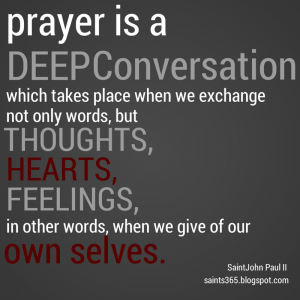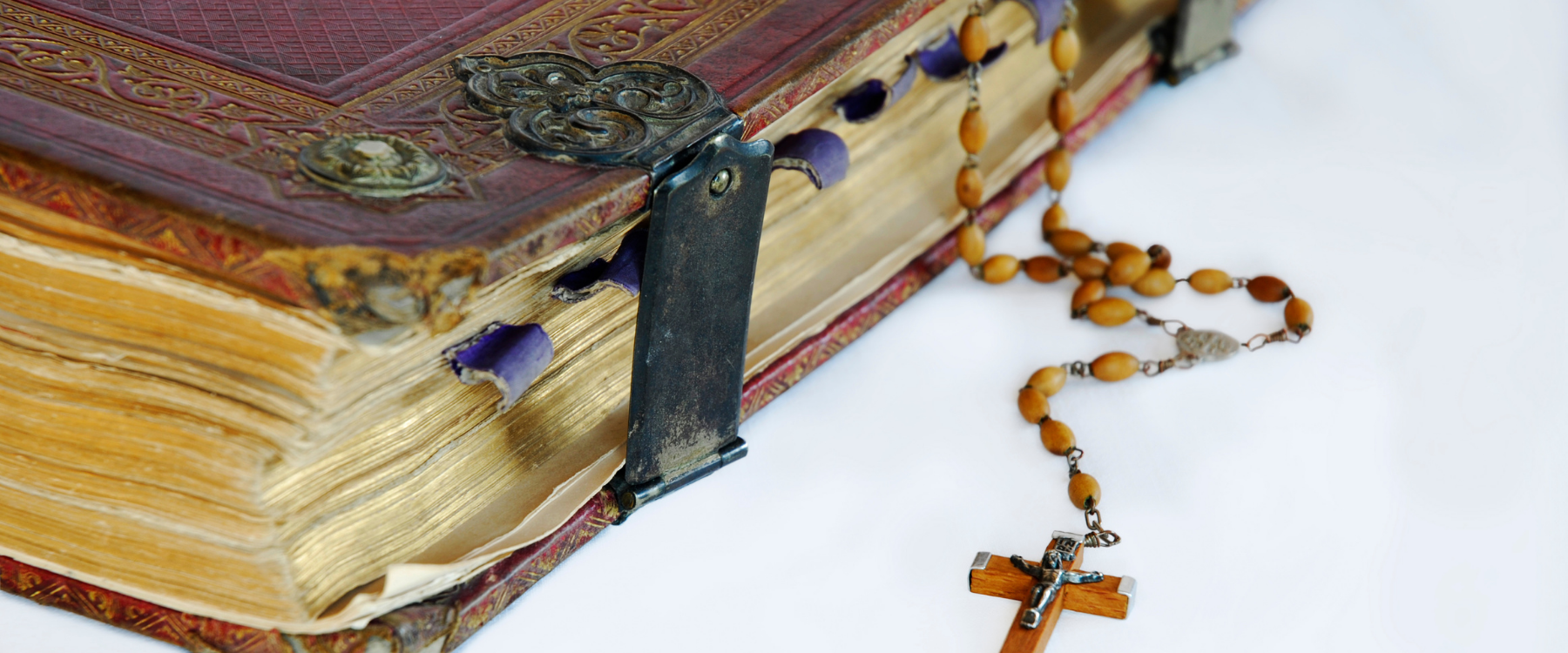Start with the most important fact: Prayer is not optional. It is not something that we can choose to do or not do; there are no sure ways to achieve our salvation that don’t include prayer.

The Four Types of prayer
Ways to Pray
Common Catholic Prayers
What is prayer?
What is prayer and why is it so important? The most common way that we understand prayer is that it is a conversation with God. Throughout the history of mankind, God has sought us out and called us to himself. Driven by love, God desires us to be in a relationship with him. When we accept that gift of love, we build our relationship with him. But like all relationships, we need to know the other. We can’t truly love another unless we know something about that person. True love puts the good of the beloved above our own, and we don’t give our lives over to complete strangers.
Now, can we ever know God fully? Of course not. But our relationship with him consists of a continual, life-long approach to the mystery he presents us; we may never fully understand, but we can, with his grace, continue to know more fully.
Does God “know” us? Yes, fully and completely. There is nothing we can communicate to him that will improve his knowledge of us. So, why speak to him at all? Because there is one more thing that we need for a healthy and fulfilling relationship with another: we have to know what we are offering to the other. We have to know ourselves. And, what better source of self-knowledge is there than to speak to one who knows us fully and completely?
To have a relationship with God, we must know the other – and ourselves. To know both, we must communicate with that Divine other, and to communicate, we must do two things: speak and listen. And therein lies the conversation, and the roots of a relationship.
But I don’t know how!
People often feel that there are obstacles to prayer; for example.
- I’m just “not good at it”
- I “don’t have the time.”
- I’m “feeling God is not there”
- I “never get an answer from God
- I “get distracted.”
- I “feel dry, unmotivated”
- I “don’t know what to say”
It’s not that all of these things aren’t real. They are very real because we are very human. And, they are not a litmus test of some kind – if you’re having trouble, it’s nothing that all of us, even some of the great saints, haven’t experienced.

St Teresa of Avila was easily distracted and would come up with whatever excuses she could find not to pray. She found the environment of the convent an impediment to her prayer life. She was often ill, during which times she found prayer even more difficult. Yet, she persevered and became a master of prayer, giving us insights for the last 450 years. But it took her 20 years of her life to achieve that closeness to God through prayer.
Teresa’s fellow Carmelite, St. John of the Cross, described the experience we sometimes face when confronted with difficulties in prayer, calling it the “dark night of the soul”, which manifests itself as a spiritual dryness, the feeling of being abandoned by God or sensing his absence.

St. Mother Teresa of Calcutta for 40 years experienced “silence and emptiness so great, that I look and do not see, – Listen and do not hear – the tongue moves but does not speak…”
These are only a few examples of saints who had difficulties with their prayer life. So, don’t despair!
How do I pray?
Do you ever feel like you have to pray just right, or it won’t work? Have you felt like your prayer wasn’t answered because you didn’t have enough faith or pray long enough? Do you think that you need to put on our halo and speak profound words? Here’s some good advice: Don’t overthink it.
Try starting with something simple, and building from there
- Help me know what to say to my son.
- Thanks for this meal, Lord.
- Lord, I need to love this person right now – help me.
- God, are you seeing this??
- Lord, I love you
- Hello, Jesus
- God, what should I do?
After all, God already knows what we need, what we are trying to say. We’re talking about a relationship here; so just check in with him! Just remember that we must be rooted in humility. As Soren Kierkegaard said, “The function of prayer is not to influence God, but rather to change the nature of the one who prays.”
All of this is not to say that we can’t improve and hone our prayer skills. There are a few questions we need to answer about prayer, if we are to get better at it. The video here gives us some opening answers to those questions, which are:
- When should I pray?
- Where should I pray?
- What and how should I pray?
- Why should I pray?
Here are a few more things to look at to help you build a better prayer life:
There are many reasons to pray with others. To name just a few: it knits us together in a community, it supports us in our own prayer practice, it opens our hearts to the needs of others, it broadens our experience of prayer, and it encourages us to set aside time for prayer. St Ann Parish is blessed to have an active small prayer group. If you are interested, read about our prayer groups on this page in the web site.
